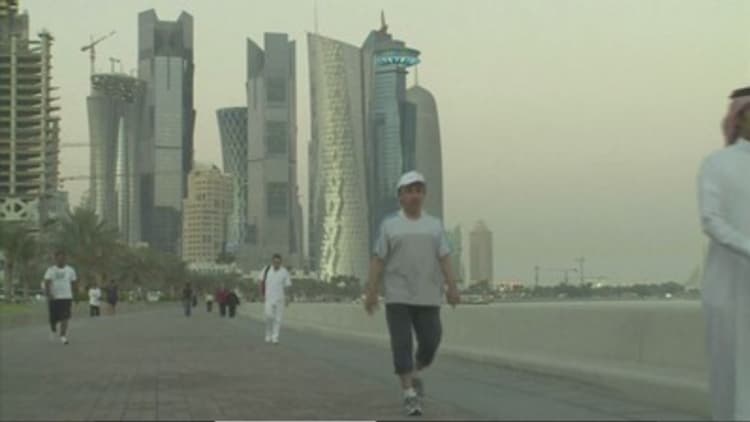
Labor exploitation remains rife in Qatar and authorities are not delivering enough reforms, according to Amnesty International, as the Gulf nation continues with a massive infrastructure project in preparation for the 2022 FIFA World Cup.
"Too little has been done to address rampant migrant labor abuse. Qatar's persistent labor reform delays are a recipe for human rights disaster," Mustafa Qadri, Gulf migrant rights researcher at Amnesty International, a human rights lobbying group, said in a news release on Tuesday.
Qatar is set to be the first Middle Eastern nation to host the FIFA World Cup – the biggest international tournament in soccer — in seven years' time.
However, both its bid to host the tournament and alleged treatment of workers on related building projects have been mired in controversy. Serious concerns remain over the treatment of the many migrant workers building the arenas and infrastructure needed.
"Unless action is taken – and soon – then every football fan who visits Qatar in 2022 should ask themselves how they can be sure they are not benefiting from the blood, sweat and tears of migrant workers," Qadri said.
"FIFA has played its part in this sorry performance. It knew there were labor rights issues in Qatar. It must work closely with the Qatari authorities and business partners to ensure the World Cup is not built on exploitation."
Amnesty International's criticism comes at the end of a year that has seen FIFA embroiled in several damaging scandals.
In September, Swiss prosecutors opened a criminal investigation into FIFA President Sepp Blatter on suspicion of criminal mismanagement and misappropriation. FIFA's ethics committee subsequently banned Blatter and Michel Platini, the head of European football's governing body, UEFA, from FIFA for 90 days.
On Tuesday, Amnesty International said Qatar has "seriously failed" to address five of its nine "fundamental" concerns relating to the labor rights of migrant workers it highlighted in a report seven months ago.
These include the issue of paying wages on time, an expansion of the country's labor inspection force – which Amnesty says has now been postponed until late 2016 – and a reform of the "kafala" system, which legally binds workers to their employer.
"The reforms proposed by the government fail to tackle the central issues that leave so many workers at the mercy of employers, yet even these changes have been delayed," Qadri said.
A common practice in the Middle East, the kafala system is a key bone of contention for critics of Qatar. Migrant workers' employed under the system are unable to leave the country or change jobs without "explicit permission" from their employer or sponsor, according to the International Labour Organisation.
"Under the kafala system it is all too easy for an unscrupulous employer to get away with the late payment of salaries, housing workers in squalid and cramped housing, or threatening workers who complain about their conditions. That is why kafala requires a major overhaul, not just tinkering at the edges," Qadri said.
In its release, Amnesty quoted one construction worker on how the Qatari system of employment affected him. "I went to my manager's office and told him I want to go home because my pay is always late," Ramesh, whose name had been changed, said. "The manager screamed at me, saying 'keep working or you will never leave!'"
Qadri added that migrant workers continued to face impediments and delays in accessing the justice system, were not allowed to form or join trade unions, faced delays in obtaining resident permits and lived and worked in "intolerable conditions."
"FIFA has bent over backwards to make a Qatar World Cup work, even taking the unprecedented step of moving the tournament from summer to winter. But apart from occasional public statements the organization has not set any clear, concrete agenda for how it will push Qatar to ensure migrant workers' rights are respected," Qadri said.
"FIFA may be moving to new leadership in 2016, but it will not be able to get past its current challenges until it makes it clear that Qatar's hosting of the World Cup is contingent on respect for human rights."
Both FIFA and Qatar's Supreme Committee for Delivery and Legacy did not immediately respond to requests for comment before the publication of this piece.




